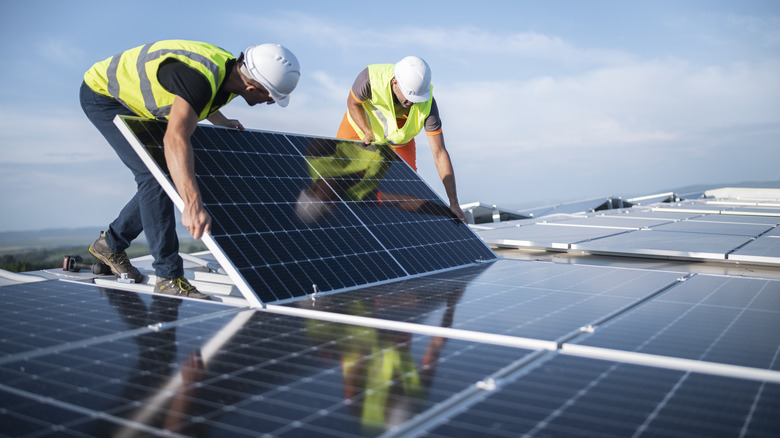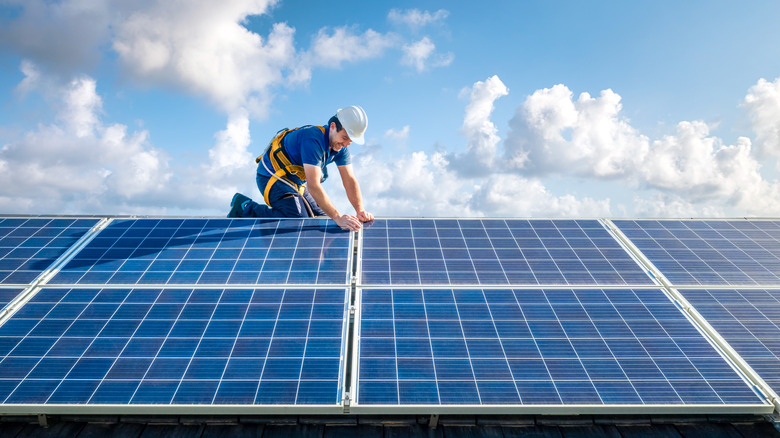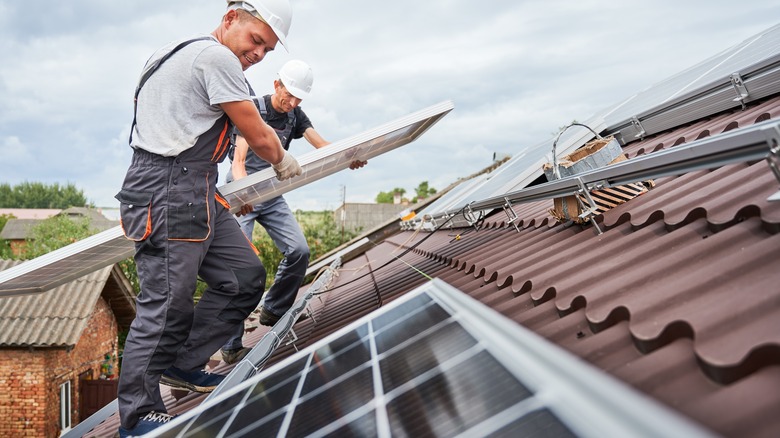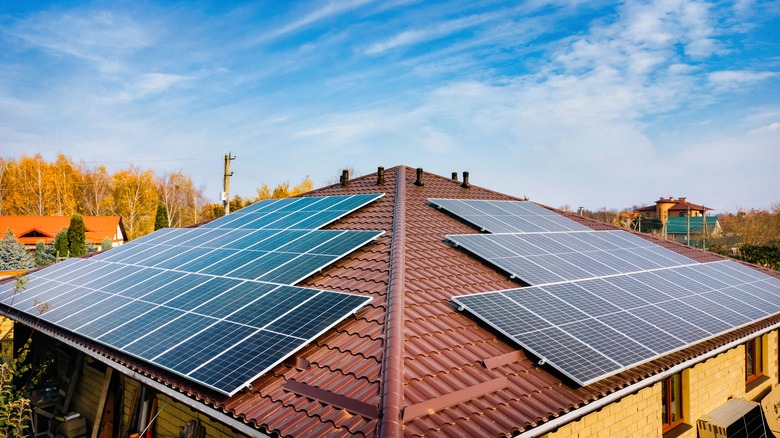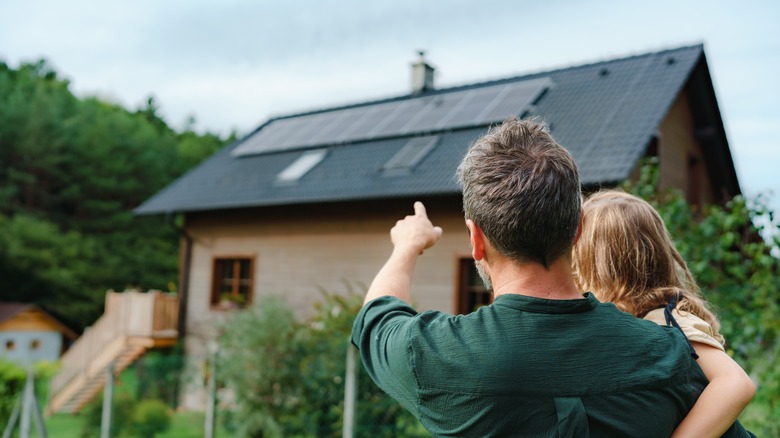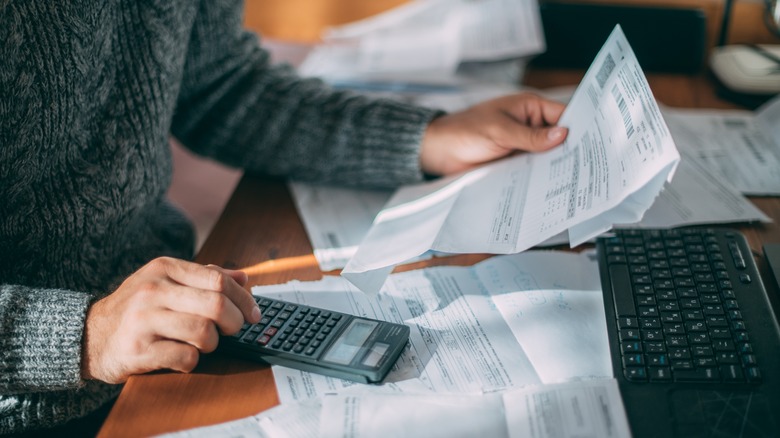6 Common Solar Panel Myths You Should Know The Facts About
As we look to be a bit greener, solar panels emerge as a solid option to revolutionize the way we power our homes. However, despite their potential to change our energy landscape, a cloud of myths and misconceptions seems to hover around them.
Maybe you've heard that solar panels only work in the blazing sun, or you're worried about the installation costs and whether they'll actually save you money in the long run. Perhaps the thought of installing them has conjured up images of a less-than-attractive home exterior, or you're concerned about endless maintenance tasks. These common myths can make the leap to solar energy seem more daunting than it truly is.
Below, we share six common solar panel myths and the facts behind them. This way, you can make an informed decision about whether solar energy is right for your home, knowing the facts over the misconceptions.
Solar panels don't work in cold or cloudy climates
One of the most enduring myths about solar panels is the belief that they're practically useless in cold or cloudy climates. If you're living somewhere where the sun seems to play a game of hide and seek more often than not, you might wonder if they are worth the investment.
First off, it's essential to understand how solar panels work. They convert sunlight into electricity but do not need direct sunlight to do so. Even on cloudy days, solar panels can capture diffused sunlight. In fact, solar panels can be surprisingly valuable in cold climates. This is because solar panels actually operate more efficiently in cooler temperatures. Excessive heat can reduce the efficiency of solar panels, so a crisp, cold day can be more optimal for solar energy production than the sweltering heat of summer.
As an example, think of countries like Germany and the U.K. These places might not be the first that come to mind when you think of solar energy hotspots. Yet, Germany has consistently been a world leader in solar power, and the U.K. has made significant investments in solar energy, despite its reputation for cloudy skies.
Solar energy systems are too expensive
If the thought of installing solar panels has ever crossed your mind, you might have been deterred the initial price tag. Interestingly, the up-front costs of solar panel systems have seen a dramatic decrease over the past decade because of technological advancements and increased market competition. Yes, there's an initial investment and some hidden solar panel costs you should know about, but it is nonetheless more accessible to a broader audience.
Moreover, when you think about the upfront cost of solar panels, you're missing out on the full financial picture. Many governments aare working to make solar more affordable through special offers like incentives, rebates, and tax breaks. These perks can cut down the overall cost of getting a solar energy system, making it a much better deal. It is also essential to think about the long-term savings on your energy bills. With solar panels, you will be producing your own electricity which can drastically reduce or even eliminate your monthly energy bills. As these savings accumulate, they will eventually cover the initial investment in the system, meaning the solar panels essentially pay for themselves over time.
Installing a solar system also adds additional value to your property, according to a study by Zillow. Homes equipped with solar energy systems often see a boost in market value, which can make it a smart long-term investment.
Solar panels require excessive maintenance
Another common worry is the notion that solar panels demand a lot of upkeep. Thankfully, solar panels are remarkably low maintenance. Once you have successfully installed them, they will do their job of converting sunlight into electricity with minimal fuss. In some cases, they might require occasional cleaning to ensure they're free of dust, leaves, or anything else that might block sunlight. In most regions, the rain naturally does this job. However, if you're in a particularly dusty area or your panels are tilted at a shallow angle, you may need to follow the solar panel cleaning instructions provided by the manufacturer from time to time.
Moreover, solar panels are designed to be durable. Before they come to you, the manufacturers test them rigorously to ensure they can endure the elements. They're built to withstand harsh weather conditions, from scorching heat to freezing cold, and even hail. Most panels come with warranties that can last 25 years or more. This longevity and durability mean that once your solar panels are up and running, they'll likely continue to generate electricity efficiently for decades with minimal intervention.
Many solar energy providers also offer monitoring services to keep an eye on your system's performance to quickly identify and address any issues, often before you even notice anything's amiss.
Solar panels will damage your roof
Your roof is a frontline defense for your home, protecting everything and everyone beneath it from the elements, and it is natural to think installing solar panels might compromise your roof. This fear is often fueled by the thought of drilling holes into the roof, which seems like it could damage the structure over time. There's also the concern about the weight of solar panels and the stress they might place on the roofing structure, especially in older homes.
While these fears are not entirely baseless, they often stem from a lack of information or understanding about the modern solar installation process. Firstly, solar panel installation is not a haphazard process. It's carried out by professionals who are well-versed in the nuances of safely securing solar panels to various types of roofing materials without causing harm. Technicians will conduct thorough inspections before any installation begins to ensure it is safe to proceed. The installers will also use specialized mounting equipment designed to anchor the panels securely while minimizing any impact on the roof itself.
Additionally, since the solar panels work by blocking direct sunlight, they can reduce wear and tear caused by UV radiation and extreme temperature fluctuations on your roof.
Solar panels will make your house look ugly
Regardless of what your style is like, everyone wants their home to look its best. Solar panel design has come a long way from the bulky, obtrusive units of the past. Today's panels are sleek, slim, and designed with aesthetics in mind. They can be installed in a manner that blends seamlessly with your roof, maintaining the integrity of your home's design, and often enhancing its overall appearance.
Moreover, innovations in solar technology have led to options like solar shingles, which mimic the look of traditional roofing materials while providing the benefits of solar energy. This means you can enjoy the best of both worlds—enhancing your home's energy efficiency without sacrificing style. These days, solar panels are also considered as a symbol of environmental responsibility and modernity. For many, it serves as a statement of commitment to sustainable living, adding a layer of prestige and forward-thinking to the household's image.
You won't have to pay electricity bills after a solar installation
The idea of escaping the cycle of monthly electricity bills is a huge draw for many considering solar installation. While this goal is appealing, the reality is a bit more nuanced.
Adopting solar energy will significantly lower your electricity bills, though it might not completely eliminate them. The reduction in your bills will vary based on a few key factors: the capacity of your solar installation, your household's energy usage, and how much sunlight your location receives. Also, even with solar panels, you may still face some minimal grid connection fees, as determined by your local utility company's policies.
The concept of net metering plays a crucial role here. In places where net metering is an option, you can feed any surplus electricity generated by your solar panels back into the grid. This can help you get credit which you can use when your solar system isn't producing enough power (such as nighttime or during extended grey weather), without the usual costs. This process can substantially lower or even zero out your electricity bills, enhancing the allure of solar energy.
